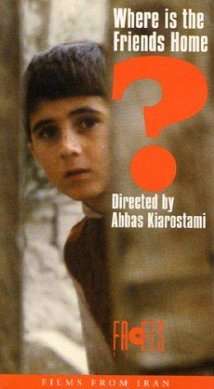Where Is the Friend's Home?
Where Is the Friend's Home? (Persian: خانه دوست کجاست, Khane-ye dust kojast) is a 1987 Iranian drama film directed and written by Abbas Kiarostami.[1] The title derived from a poem by Sohrab Sepehri, it is considered the first installment in Kiarostami's Koker trilogy, followed by Life, and Nothing More... and Through the Olive Trees, all of which take place in Koker, Iran.[2]
| Where Is the Friend's Home? | |
|---|---|
 Film poster | |
| Directed by | Abbas Kiarostami |
| Produced by | Ali Reza Zarrin |
| Written by | Abbas Kiarostami |
| Starring | Babak Ahmadpour Ahmad Ahmadpour |
| Cinematography | Farhad Saba |
| Edited by | Abbas Kiarostami |
Release date |
|
Running time | 83 minutes |
| Country | Iran |
| Language | Persian |
The film tells a deceptively simple account of a conscientious schoolboy's quest to return his friend's notebook in a neighboring village, since, should his friend fail to hand it in the next day, it is likely he will get expelled. Hence this film has been seen as a metaphor for the sense of civil duty, about loyalty and everyday heroics. The traditional beliefs of Iranian rural people are also depicted.
The film is among the top ten in the BFI list of the 50 films you should see by the age of 14.[3]
Plot
As he prepares to do his homework, Ahmed realizes that he accidentally brought home a notebook belonging to one of his classmates. Knowing that his friend may be expelled if he does not have the notebook in order to complete his homework, Ahmed goes looking for his classmate. When he is unable to find his friend's home, Ahmed ends up doing the homework for his friend; the homework is deemed excellent by the teacher.
Cast
- Babek Ahmedpour as Ahmed
- Ahmed Ahmedpour as Mohamed Reza Nematzadeh
- Kheda Barech Defai as the Teacher
- Iran Outari as Mother
- Ayat Ansari as Father
- Sadika Tohidi as the Persian Neighbour
- Biman Mouafi as Ali, a neighbour
- Ali Jamali as Grandfather's Friend
- Aziz Babai as the Waiter
- Nader Gholami as the Property Owner
- Akbar Moradi as the Old Man from Azerbaijan
- Teba Solimani as the Husband
- Mohammad Reza Parvaneh as the Man Mistaken for Ali
- Farahanka Brothers as the Young Boy
- Maria Chdjari as the Girl who Stutters
- Hamdollah Askarpour as the Old Man
- Kadiret Kaoiyenpour as the Religious Old Man
- Hajar Farazpour as the Apple Seller
- Mohammad Hossein Rouhi as the Carpenter
- Rafia Difai as Grandfather
- Agakhan Karadach Khani as the Street Vendor
Festivals
It won the Bronze Leopard at the 1989 Locarno Film Festival.[4] It also won the Golden Plate at the Fajr Film Festival.
Legacy
Where Is The Friend's Home? was Kiarostami's first film to gain major international attention. The film's title has sometimes been translated as Where Is My Friend's House?[2]
Iranian filmmaker Bahman Ghobadi said that "I always have this film in mind because of the director's profound perspective on filmmaking and its strange and distinct structure."[4]
Jonathan Rosenbaum called Kiarostami the greatest living filmmaker and called the film (along with Through the Olive Trees and Life and Nothing More) "sustained meditations on singular landscapes and the way ordinary people live in them; obsessional quests that take on the contours of parables; concentrated inquiries that raise more questions than they answer; and comic as well as cosmic poems about dealing with personal and impersonal disaster. They're about making discoveries and cherishing what's in the world--including things that we can't understand."[5]
References
- Mike Lorefice (2006). "Where Is the Friend's Home, Iran - 1987". metalasylum.com. Retrieved 2007-02-27.
- "Where is My Friend's House? (1987)". Turner Classic Movies. Retrieved March 1, 2015.
- "BFI's 50 films you should see by the age of 14". IMDb. Retrieved 2019-10-03.
- "Where is the Friend's Home?". Toronto International Film Festival. Retrieved February 23, 2015.
- Rosenbaum, Jonathan. "Where Is My Friend's House?". Chicago Reader. Retrieved February 23, 2015.